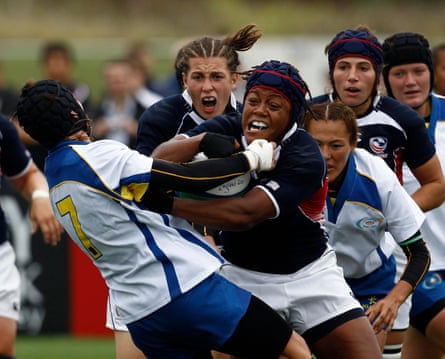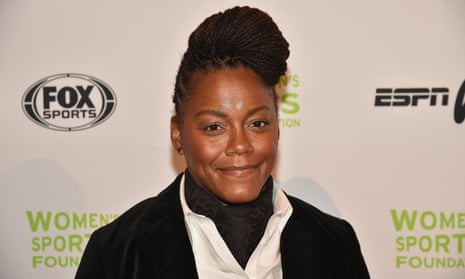Phaidra Knight learned of her election to the World Rugby Hall of Fame in an email from the Australian great John Eales. Another World Cup-winning captain, François Pienaar of South Africa, sent his own congratulations. She will be inducted on Friday in Rugby. With her will be the fly-half Rob Andrew and French lock Fabien Pelous, the Argentina No10 Felipe Contepomi and another hard-hitting North American flanker, Al Charron of Canada. At 43 and after an 18-year career that took her to 35 caps for the USA and three World Cups, Knight is a member of rugby’s nobility.
Not that many know it in her adopted city, New York, or in the US at large. Rugby union is growing in America but no one in the Upper West Side cafe where we meet raises an eyebrow as Knight walks in, apologises for being held up in crosstown traffic and orders an appropriately complicated coffee. If they knew her story, they might.
The Hall of Fame news has produced a lasting high, she says – but it is not a straightforward tale. Knight was born in Irwinton, Georgia, on Independence Day 1974, and grew up a black girl in a mostly white area. Her childhood, she says, picking her words with care, played out in “a pretty physical environment”. She later suffered from premenstrual dysphoric disorder, which causes mood swings, anger and depression. Growing into her 5ft 5in, 170lb frame, bristling with frustration, she was in desperate need of release.
She could have found it in rugby, which exists in Georgia as it does across the US. But in Wilkinson County, as pretty much everywhere in the American south, football is king. Knight loved tackling and wanted in, but “wasn’t really allowed to play organised football, which was for just the boys. I got away with occasionally playing with my next-door neighbour, JP. But one day I tackled him and broke his arm, so that was the end of our tackle football.”
At high school, Knight played basketball and volleyball. Then she went to Alabama State University, one of the HBCUs – historically black colleges and universities – on an academic scholarship. That sent her on to law school at the University of Wisconsin‑Madison, where she thought she might find a spot on the basketball team. Rugby found her instead.
“I was attending a law school function and a woman named Kelly was there with her partner,” she says. “She asked if I’d ever played rugby and I said: ‘No, never even heard of it. Never seen it.’ And she invited me to come out to training. I had never even seen a rugby ball. I just jumped in and started running. I ran through people and they asked me to come back for their next practice. I got a mouthguard and that was it.”
Rugby quickly came to mean more than mere sport. The Badgers were as tight-knit as any rugby club: Knight got her first job in Chicago but spent three years commuting 150 miles each way to play, such was the pull of the colours. But in a way in which women’s rugby has undoubtedly led the men’s game, the team was also unquestioningly inclusive. “Sexuality? Yeah, it was part of it. I didn’t even have an awareness that this was a part of me, prior to going to Wisconsin. It wasn’t that I was in any kind of denial. But when I started playing rugby and was able to see homosexuality in a way that was accepted and to see both hetero and homosexual people in the same unit, and it didn’t matter? It was just like: ‘Oh, OK, that makes sense.’
“Rugby was a huge part of me being able to come into a space that’s safe, and also to just discover that was a part of who I was. There obviously was negativity in the world as it relates to homosexuality, but in rugby it wasn’t anything different. It just was. And that was pretty cool.”

Laughing at the idea of rugby as a decidedly unsafe safe space for vulnerable or confused young people, Knight admits she quickly got “hooked” on a game that provided “therapy for many years”. It was also, eventually, her ticket to New York.
Elsewhere, Knight has talked about how she came to see rugby as a form of expressionist art. She has applied that sophisticated thought to practical ends, working with Play Rugby USA, which takes the game into the inner cities, and coaching at Rikers Island, the notorious jail in New York’s East river. She is now part of a rugby programme set in the heart of the Bronx.
“I see it with the young women and the men that I coach at Monroe College,” she says of a school where 85% of undergraduates are black, Hispanic or Asian. “In rugby, they have this licence to go out and vent and release but in a very constructive manner, a very technical manner. And when they leave the pitch, they’re good, you know?
“There’s a big difference in going and causing a street fight and walking away feeling awful because you’ve done something illegal, you’ve harmed someone, versus going out and probably spending the same type of energy in a more controlled manner, on a rugby pitch, and walking away, grabbing a drink and having a meal with your opponent.”
At the Hall of Fame, Knight will grab a drink with men and women from the highest ranks of the game. Her place among them is secure. But you suspect a large part of her heart will remain on the rough grass fields of Wisconsin, the busy pitches of Randall’s Island under the Triborough Bridge, where she played for New York Rugby Club, and the unforgiving asphalt of the Bronx and Rikers. Hers is a rugby life that could only have happened in America.
As she sees it, America is about to happen to rugby – and not just through Pro14 or Major League, Super 7s or Premiership games in Philadelphia. For a first step off the field she has formed a company, Peak Unlimited, that will offer the game to children aged five to 12. She is also working as an analyst for NBC and is on the board of USA Rugby.
Asked recently what it meant to be a flanker, Knight defined the position as “the craziest on the field … a free radical”. It was a very personal description, as she showed when she switched from prop early in her Test career and when, at the other end of it, she took a surprise break to chase – and narrowly miss – a spot on the US bobsled team at the 2014 Winter Olympics.
Coffees done, we talk more about the challenges of steering rugby into the American mainstream. Knight expresses a willingness to go anywhere, meet anyone and do anything to help the process along. “I’m a free radical still,” she says. “Doesn’t change.”

Comments (…)
Sign in or create your Guardian account to join the discussion